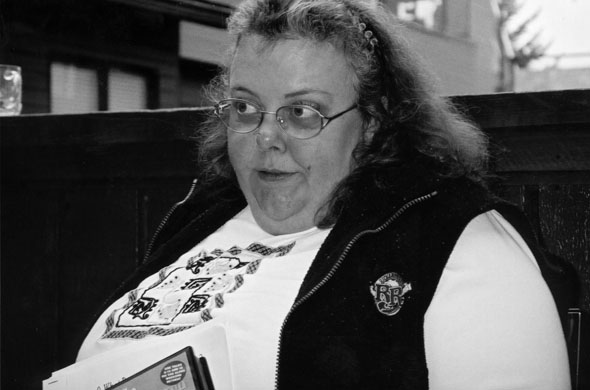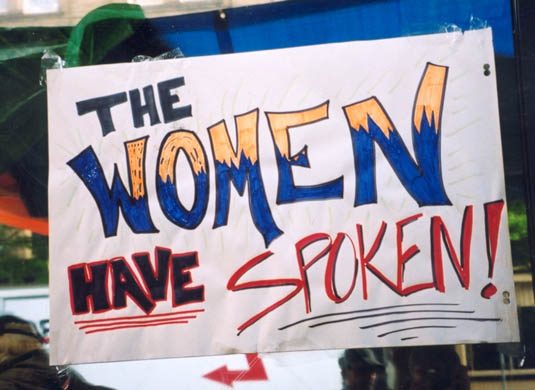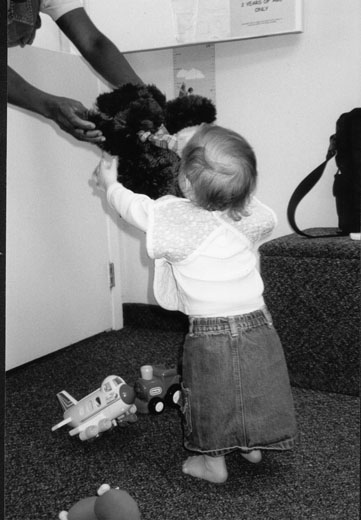Author Susan Scott is our guest blogger this week. In the lead up to the All Our Sister’s conference happening in London, ON May 9-12, Susan shares some insight into the hard lives of homeless women across Canada. Susan’s book, All Our Sisters, is available from University of Toronto Press.
Analysis of Canada’s homeless often leaves out the unique position of women

Her teeth were lose, her nails wobbled in their sockets and her energy levels were down to that of a snail, but what else could Patricia Diaz expect on a thousand empty calories a day?
Patricia, and legions of women like her across Canada, were thrown into lives of deep poverty in the mid-1990s when the federal and provincial governments became concerned about their bottom lines and cut services from Victoria to St. John’s. They saved money but destroyed people, especially women and children.
“I lost everything. I became homeless because of policy,” says Patricia who when she was on social assistance regularly went hungry to feed her kids. Almost worse than the financial blow, though, was the propaganda put out to justify it. “As single mothers, we were labelled beer-drinking sluts. It was really, really bad. It was an accumulation of hatred. We became the scapegoats of society.”
Patricia, who now runs a women’s buddy assistance program with Forward in Toronto, is attending Canada’s first national conference on women and security of housing, All Our Sisters, in London, ON, May 9-12th and has hopes that it will be the catalyst to change.
One of the things that makes this conference different is that women of lived experience of homelessness and extreme poverty are fully participating delegates. Their voices and their solutions will be on the table alongside those of a more academic nature.
Women living in poverty across the country are wondering why it took so long to put their needs under the microscope to create change so that everyone has the basic human right of adequate housing.

As Patricia says: “It’s time.”
And she’s right. Although studies say that women constitute about one quarter of the homeless population, they also show they are the fastest growing segment.
“When we think of the homeless, we usually think of men,” says Shelley Yeo, co-chair of the All Our Sisters National Forum. “Many of the women are invisible. They may be living with abusive partner because they can’t afford to rent their own place; they may be like the woman in Calgary staying in one room with three other adults and three children; or they may be trying to make a home out of a place that has mushrooms growing out of the carpet and mice in the walls. None of those is a home.
“We don’t know how many there are, but we definitely need to hear and to listen to what women have to tell us about the systemic barriers,” says Yeo.
One of the key issues for women is poverty. There’s lots of talk and concern about child poverty, but we forget that children are poor because their parents are poor. One in five women in Canada lives in poverty and the Canadian Association of Elizabeth Fry Societies says that 80 percent of women’s crime is poverty related. Hunger and malnutrition gnaws at their bones.
When the Diaz family lost their Cambridge, ON home and the family was dispersed due to welfare cuts, Patricia recalls staring at the table. “I realized that due to a lack of food we hadn’t had a meal at it for three or four years.”
According to Food Banks Canada Hunger Count 2010 a record number of 867,948 people used Canadian food banks, 38 percent of them children and young people under18. There were more than 80,000 new users. Remember in the good, not-so-old days when food banks were just a temporary solution? The count also gives eight recommendations to decrease these appalling stats. The first is a national poverty strategy. Another is a national housing strategy. To our shame we are one of the few developed countries without one. Other suggestions included fairer EI and better and cheaper day care – very important to women.
It should be noted that these suggestions do not include more donations, nor more food banks, but they tackle the underlying systems – or lack of – that hold people down. As Canadians we find it easier to donate a few cases of pasta than to lobby our politicians for meaningful policy changes.
“I can’t get macaroni into me anymore,” says Patricia literally sick and tired of the failed charity model.
Once a woman becomes homeless, it is extremely difficult for her to find her way back into Canadian society because you lose so much along with the bricks and mortar – everything from safety to status. Struggling with the effects of malnutrition, Patricia managed to obtain a degree, but that led to an ill-paid job cleaning toilets. Others find work as security guards and telemarketers, or other low-wage positions that mean toiling round the clock at two or three jobs, or having to make choices like whether to feed the kids, or pay the rent.

Poverty doesn’t discriminate, nor does violence, another big factor in women’s lives. From childhood abuse to bureaucratic torture, violence leads to trauma which is under-diagnosed and hardly ever treated in marginalized women. Often the women are blamed for their symptoms. For example, women are dismissed for making “poor choices,” when in fact it was the best decision they could make given that violence affects the brain’s ability to reason.
While the bedrooms of the nation are not exactly safe places, the streets aren’t havens either. Women report being peed on and worse while sleeping at mixed shelters and a report released in Winnipeg this month says 40 percent of homeless women in that city feel unsafe in emergency shelters and 46 percent had been physically assaulted in the past year.
The system itself also kicks people in the teeth.
When a Calgary woman with a sick child has a letter from a cardiologist telling her that he requires “constant, round-the-clock care,” what is she supposed to do when her government worker tells her that she has to find a job because the letter does not specify 24-hour care? What is a woman supposed to do when she’s evicted from subsidized housing because the grants she has received for training courses have raised her income over the limit? These are not academic questions, they are all too real.
Multiple and varied forms of violence result in what Patricia calls “extreme duress,” treatment for which usually means doses of psychiatric drugs rather than real help for their issues. Instead, Patricia is a strong advocate, of talking circles and women assisting each other.
And, yes, you can bet that Patricia’s voice will be heard at the conference.
Among other things she will tell participants about her mutual support group that pays women to do jobs like accompanying someone to a medical appointment, ($25) or taking a meal to a housebound woman ($10). The extra $50 a week can be enough to buy a sewing machine which could be the start of small business.
Most women living on the margins who are participating in All Our Sisters hope for two outcomes: prevention in the form of systemic change, and better solutions and supports for women already caught in the maelstrom of poverty and the Gordian knot of red tape.
If Patricia has her say, their voices will ring out in May.
I’m going to grab (the opportunity) by the horns and really tell the tale,” she says. “I’m tired of being mothered; we are mothers. We didn’t put ourselves in this stinking mess.”
But what then? Will their words fall on deaf ears and stony hearts?
As a society that believes in human rights and dignity, Canadians should listen and then act because that’s the right thing to do; but if that’s not compelling enough then check the dollars and cents. In one province alone, Ontario, poverty costs taxpayers $32 to $38 billion annually, says the provincial association of food banks. That’s a big hole in everyone’s wallet.
About the author
After attaining her degree from Oxford University, Susan Scott came to Canada in 1967. Currently a freelance writer in Calgary, she has also worked for three Canadian newspapers. In recent years, Susan has spent a great deal of time in Canada’s underworld of drop-ins, shelters and food banks gathering information for her second book, All Our Sisters: Stories of Homeless Women in Canada. Her first book was No Fixed Address: Tales From The Street. Besides volunteering with the Jesus Loves You Society of Calgary, Susan likes to hike and travel, particularly on the Indian sub-continent.